Acupuncture in North York
Registered, Gentle, and Research-Informed Care
Acupuncture clinic near Yonge & Sheppard - safe, registered acupuncture care — even if needles make you nervous.
Book a Free 15-Minute Discovery Call
A no-pressure conversation where you can ask questions and understand your options.
(416) 730-8218 Book OnlineA Gentle Approach to Acupuncture, Even If Needles Concern You
Many people curious about acupuncture have questions about the needles. That’s completely understandable.
Here’s what you should know:
- Acupuncture needles are remarkably fine, almost as thin as a human hair
- A blood draw needle is more than three times wider
- Most people describe sensations as light tingling, gentle pressure, or nothing at all
- Many are surprised by how little they feel, some even fall asleep during treatment
Our treatment rooms include table warmers, soft music, and infrared heating lamps. A call button is always within reach to immediately summon your practitioner.
If you’re sensitive to needles, we can begin with minimal stimulation and adjust based on your comfort.
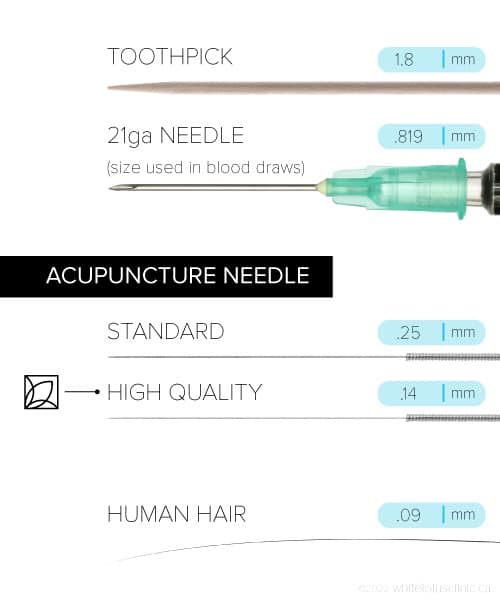
Meet Your Registered Acupuncturist
Ms. Daryl Fang, R.Ac
Daryl has over 15 years of clinical experience at White Lotus Clinic. She is registered with the College of Traditional Chinese Medicine Practitioners and Acupuncturists of Ontario (CTCMPAO).
Many of Daryl's patients come to her for support with fertility, women's health, PCOS, and pain. She also provides cupping therapy and moxibustion.
Daryl works collaboratively with patients' existing healthcare providers and is available for a free discovery call before your first visit.
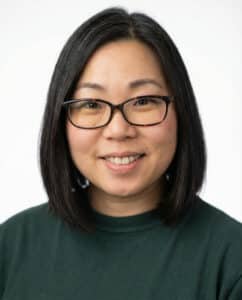
Acupuncture and Integrative Clinic in North York
White Lotus Clinic has offered acupuncture for over 20 years as part of an integrative healthcare environment.
Acupuncture is provided by our Registered Acupuncturist, Daryl Fang, R.Ac. For patients who are also seeing one of our Naturopathic Doctors, care can be coordinated — though each practitioner provides care independently within their regulated scope, and coordination is offered only when appropriate and with patient consent.
This means you can receive acupuncture on its own, or as part of a broader health plan if you choose.
What is Acupuncture?
Acupuncture is a regulated healthcare practice in Ontario. Only Registered Acupuncturists (R.Ac.) or Registered TCM Practitioners (R.TCMP) may provide treatment.
The practice involves gentle insertion of sterile, single-use needles at specific points on the body. Modern imaging methods have documented measurable nervous system and circulatory responses to acupuncture. These findings help explain why acupuncture has been widely studied — but they are not guarantees of individual outcomes.
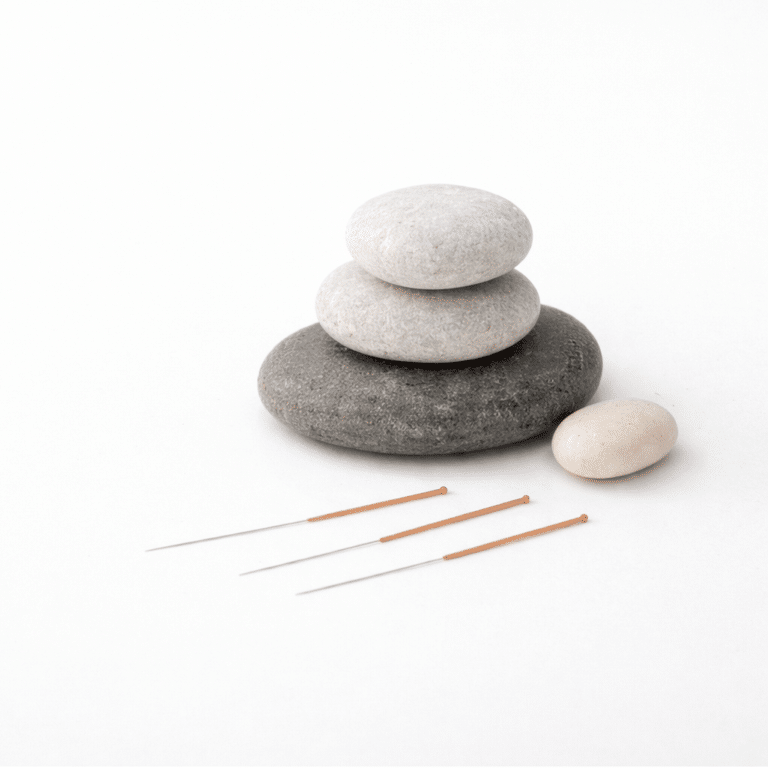
> View Research References
- Takayama S, et al. Blood flow changes with acupuncture. Evid Based Complement Alternat Med. 2012.
- Wang Y, et al. Anti-inflammatory effects of electroacupuncture. PLoS One. 2014.
- Dou B, et al. Neuroimmune crosstalk in acupuncture. Front Neurosci. 2021.
- Liu L, et al. Brain connectivity changes with acupuncture. Neuroimage Clin. 2022.
- The Acupuncture Evidence Project. 2017.
- Lu L, et al. Evidence mapping of acupuncture reviews. BMJ Open. 2022.
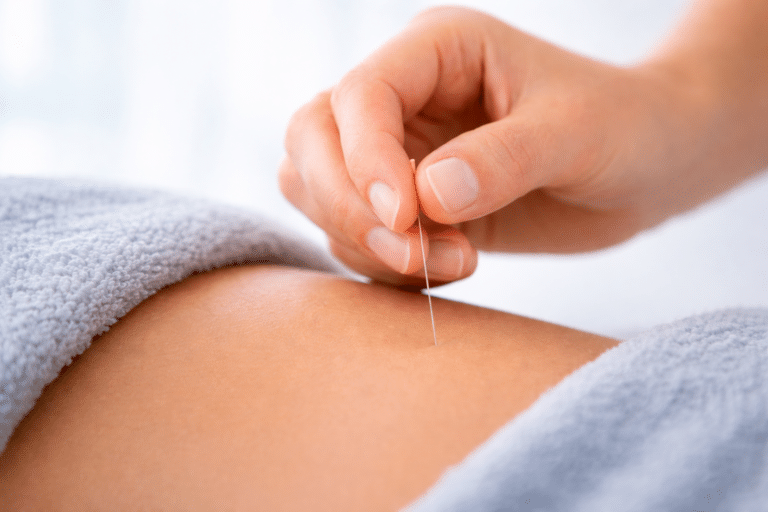
What to expect during a session
- Assessment — Your acupuncturist reviews your health history and current concerns
- TCM Diagnosis — Traditional tongue and pulse assessment
- Treatment — Sterile needles are gently inserted at specific points
- Rest — You relax for 20–45 minutes with needles in place
- Completion — Needles are removed and next steps discussed
Most patients find the experience deeply relaxing.
Acupuncture Support for Health Concerns
Within a Traditional Chinese Medicine framework, acupuncture is used to support a variety of health concerns. Below are areas where patients commonly seek care at our clinic.
Fertility and Reproductive Support
Common concerns include:
- Support during natural conception efforts
- IVF and IUI cycle support
- Irregular menstrual cycles
- Ovulation-related concerns
For those building a family while balancing work and daily life, acupuncture can be part of a supportive, integrative approach.
Women's Health Concerns
Common concerns include:
- Menstrual pain and cramping
- Irregular or absent periods
- Premenstrual symptoms (PMS)
- PCOS-related concerns
- Menopausal and perimenopausal symptoms
- Postpartum recovery support
Whether you're managing monthly discomfort or navigating a transition, acupuncture offers a calm, supportive space.
Read more about our approach to Acupuncture for Hormonal Conditions →
If you're dealing with something similar and aren't sure where to start, you can ask Daryl your questions during a free 15-minute call.
Pain and Musculoskeletal Concerns
Common concerns include:
- Back pain (lower and upper)
- Neck pain and stiffness
- Knee and joint discomfort
- Headaches and migraines
- Sports and repetitive strain concerns
For those dealing with ongoing discomfort that affects daily life, acupuncture offers a gentle, non-invasive option.
Read more about Cupping Therapy as a complementary approach →Stress, Sleep, and General Wellness
For North York parents juggling family and work, or professionals managing daily stress, acupuncture offers a space to pause and reset.
Acupuncture is traditionally used to address patterns related to stress, sleep, and mood. Research has documented effects on the autonomic nervous system, which regulates relaxation responses.
Common concerns include stress and tension, sleep difficulties, anxiety and mood concerns, fatigue and low energy, and digestive concerns.
Many patients incorporate acupuncture as part of their regular health maintenance routine.
Why North York Patients Choose White Lotus
- 20+ years serving the Yonge & Sheppard community — one of North York's longest-established integrative clinics
- Registered, regulated care — your acupuncturist is licensed by CTCMPAO and meets ongoing professional standards
- Experience with cycle-sensitive care — our clinic has extensive experience supporting patients undergoing IVF and reproductive care, and we understand the timing, communication, and sensitivity these journeys require
- TCM-rooted approach — our care is grounded in Traditional Chinese Medicine, which can complement your existing physio, massage, or conventional care
- Comfort-first environment — table warmers, infrared lamps, soft music, and graded exposure for sensitive patients
- Convenient location — steps from Sheppard-Yonge Station, minutes from the 401
While many patients come to us for reproductive support, we also see a large number of people for pain, stress, sleep, and general wellness.
As a small, long-standing clinic, our patients appreciate seeing familiar faces and receiving care that feels personal and unrushed.
Your First Visit
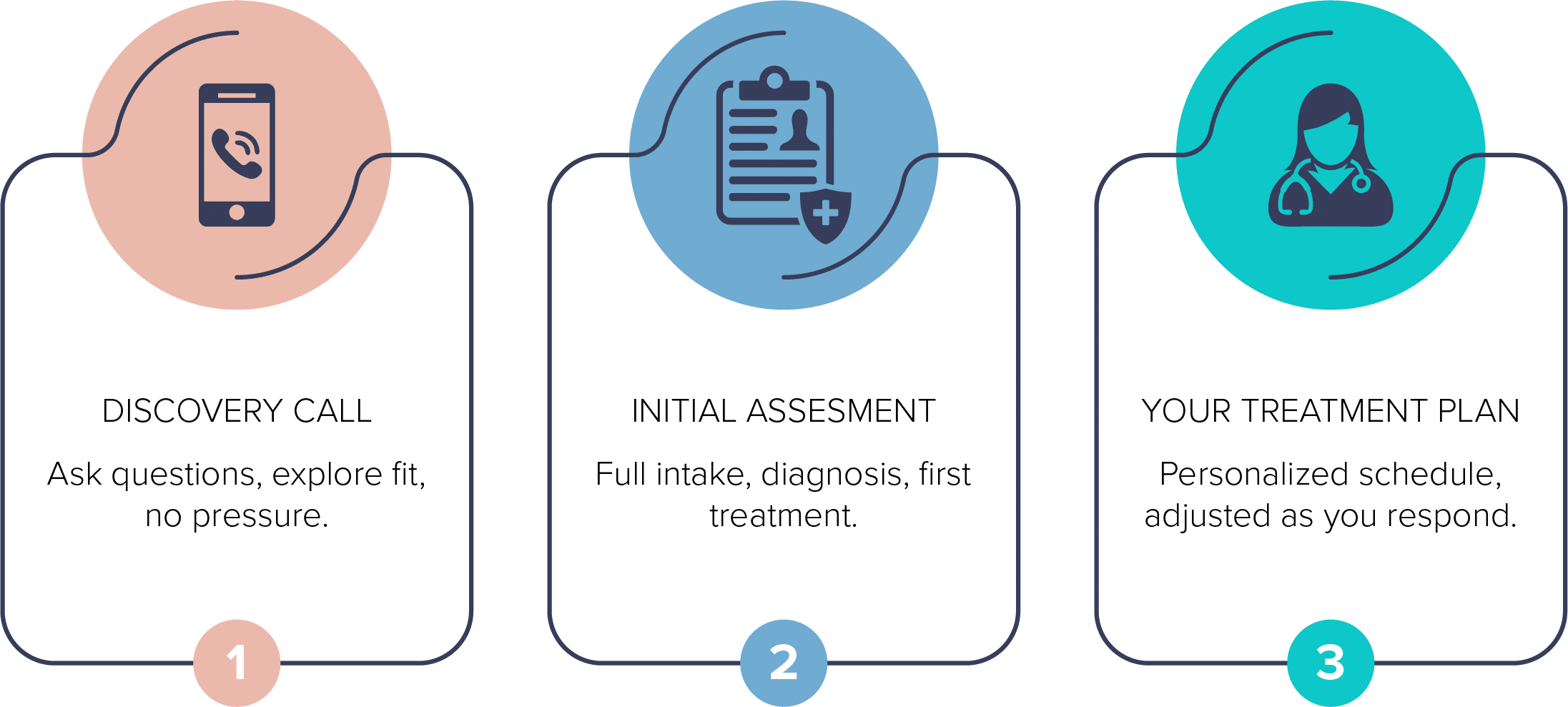
Step 1: Discovery Call
(Optional, No Charge)
(Optional, No Charge)
A 15-minute phone conversation to:
- Ask questions about your specific concerns
- Understand whether acupuncture may be appropriate
- Learn what to expect
If acupuncture is not a good fit, we'll let you know — your wellbeing comes first.
No pressure. No obligation.
Step 2: Initial Assessment
(60 minutes)
Your first visit includes:
- Comprehensive health history review
- Traditional tongue and pulse diagnosis
- Discussion of your practitioner's assessment
- Your first acupuncture session
Step 3: Your Treatment Plan
Following your initial visit, your acupuncturist will recommend a personalized schedule based on your assessment. Plans are adjusted based on your individual response.
Practical Information
Fees & Insurance Coverage

Acupuncture is not covered by OHIP but is included in many extended health plans.
We Offer Direct Billing Available Through Telus eClaims:
We offer direct billing through Telus eClaims for many major insurers. For other plans, we provide official receipts for reimbursement. For Sun Life plans, patients submit claims directly. We provide all required receipts at checkout.
Coverage varies by plan; our team can check direct-billing eligibility when you visit.
View our current fee schedule or ask us when you call.
Location & Community Access
White Lotus Clinic
📍 121 Willowdale Ave, Suite 301
North York, Ontario M2N 6A3
We're located in the Willowdale neighborhood, just east of Yonge Street.
Getting Here:
- By Transit: Short walk from Sheppard-Yonge Station (Yonge line)
- By Car: 3 minutes from the Highway 401 Bayview exit
- Parking: Available on-site and on surrounding streets
Serving Our Community:
We provide registered acupuncture care to patients across North York, including Willowdale, Lansing, Newtonbrook, Bayview Village, and the Greater Toronto Area.
Hours & Availability
| Monday | 9:00 AM – 5:00 PM |
|---|---|
| Tuesday | 9:00 AM – 5:00 PM |
| Wednesday | 9:00 AM – 5:00 PM |
| Thursday | 9:00 AM – 7:00 PM |
| Friday | 9:00 AM – 5:00 PM |
| Saturday | 9:30 AM – 4:30 PM |
| Sunday | Closed |
Frequently Asked Questions
Does acupuncture hurt?
Most patients experience minimal to no discomfort. Acupuncture needles are extremely fine — thinner than a human hair. Common sensations include gentle tingling or mild pressure. If you're concerned, let your practitioner know — we can adjust our approach.
Is acupuncture safe?
Acupuncture is a regulated profession in Ontario. Our practitioner is registered with CTCMPAO and meets ongoing licensing requirements. We use sterile, single-use needles and clean field technique. Side effects are generally mild (occasional bruising or fatigue).
Is acupuncture safe during pregnancy?
Acupuncture can be received during pregnancy, though certain points and approaches are modified. Your practitioner will review your situation and discuss any precautions. If you're pregnant or planning to become pregnant, let us know when you book.
How many sessions are typically recommended?
Treatment recommendations are individualized. Acute concerns may respond to shorter courses; chronic or complex concerns often benefit from longer ones. Your practitioner will discuss expectations during your initial assessment.
What should I wear?
Comfortable, loose-fitting clothing that can be rolled up above elbows and knees. Gowns and draping are available as needed.
Can acupuncture be combined with other treatments?
Yes. Acupuncture can be received alongside conventional medical care, naturopathic medicine, physiotherapy, and other treatments. We work collaboratively with your existing providers.
Is acupuncture appropriate for everyone?
Your practitioner will review your health history to confirm suitability and discuss any precautions relevant to your individual situation. If acupuncture isn't a good fit for your needs, we'll let you know.
Is acupuncture covered by insurance in Ontario?
Acupuncture is not covered by OHIP, but many extended health insurance plans include acupuncture coverage. Coverage varies by provider and policy. We recommend checking directly with your insurer.
Learn More
Research References
Acupuncture has been the subject of extensive research. Key sources include:
- World Health Organization — Traditional Medicine Strategy
- The Acupuncture Evidence Project (2017)
- BMJ Open (2022) — Evidence mapping of acupuncture reviews
Full citations available in the links above.
Related Articles
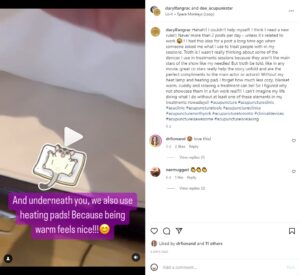
Warm Comfort During Acupuncture – Equipment Tour
View this post on Instagram A post shared by Daryl Fang RAc (@darylfangrac) Keeping you
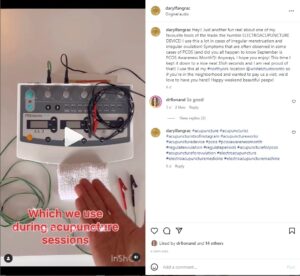
About our Electro-Acupuncture Machines
View this post on Instagram A post shared by Daryl Fang RAc (@darylfangrac) Learn About
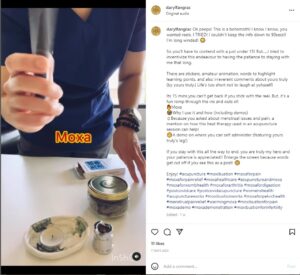
Moxa – Fertility, menstrual conditions and pain relief
View this post on Instagram A post shared by Daryl Fang RAc (@darylfangrac) Dayrl Fang
Ready to Explore Acupuncture?

We're here to answer your questions.
📞 Free 15-Minute Discovery Call
Speak with our Registered Acupuncturist — no pressure, just information.
📅 Book Your Initial Assessment
60 minutes | Comprehensive assessment + first treatment

